Original publication (in Spanish) here.
By Monserratt Tellez and Jose Sampietro
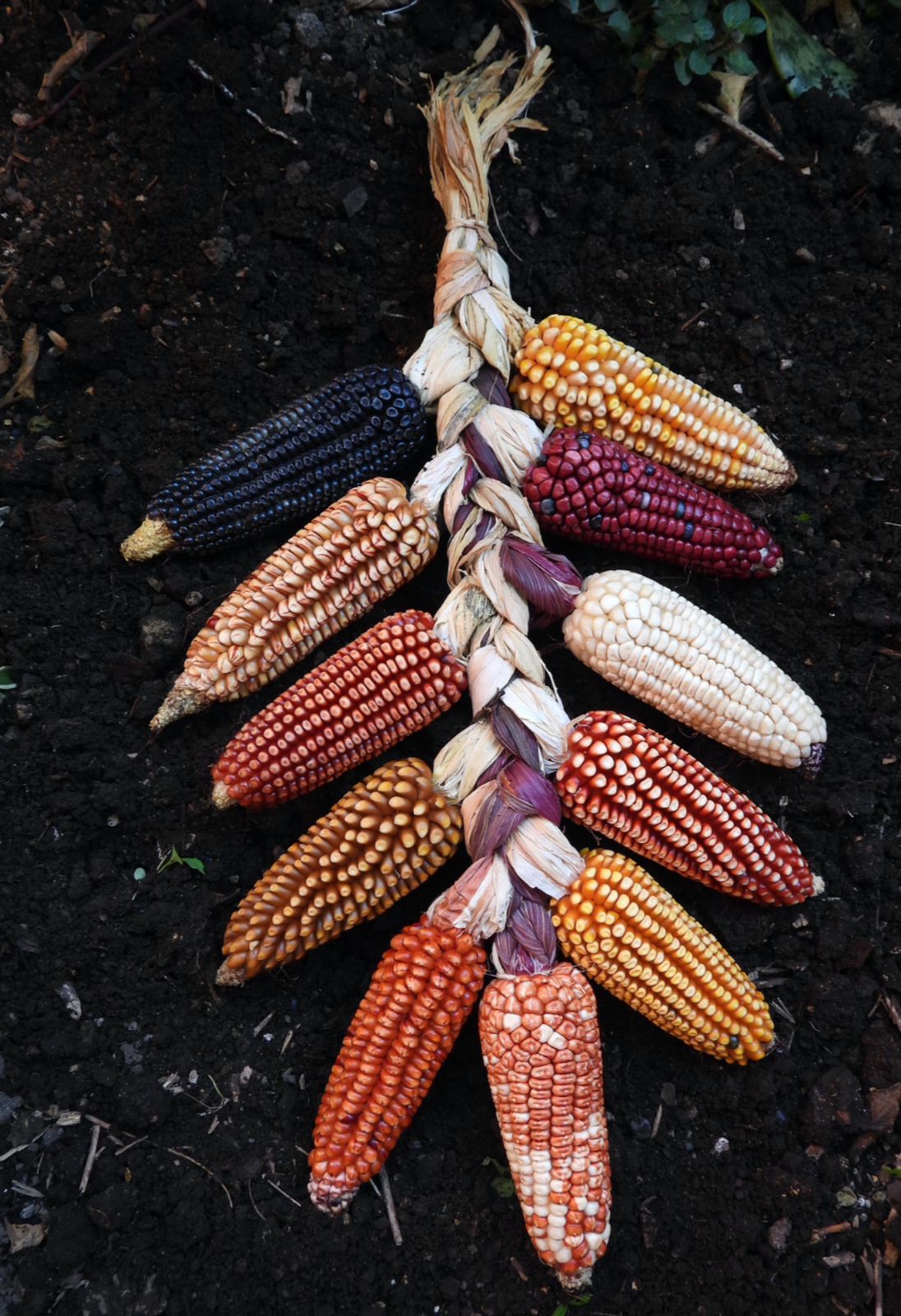
The United States government is trying to force Mexico to continue importing genetically modified corn, despite proven negative impacts on health and the environment, because it represents a multi-million-dollar business for US agribusiness. In August 2023, the U.S. government called for a dispute panel to challenge Mexico’s partial ban on importing genetically modified corn and the agrotoxic glyphosate within the framework of the US-Mexico-Canada Agreement (USMCA, formerly NAFTA). On July 26 and 27, the dispute settlement panel held a hearing for each side to present oral arguments, with Canada participating as an interested third party.
Although the panel’s own rules of procedure stipulate that the hearings must be open for the public to observe, the panel and the parties chose to broadcast them only through a closed Zoom meeting with restricted space pre-registration and express instructions not to share access. The meeting was announced on the website of the three parties of the USMCA Secretariat with no dissemination through other official media in any of the three countries, again limiting the possibility of registration since this website is not well known by the general population. Even after all these filters and barriers, not everyone who registered was granted access. The denials revealed the existence of a discretionary selection criterion applied even to those who registered in due time and form.
Many people were interested in watching the proceedings. The case will decide the future of the cultural pillar and food base of the Mexican population, maize, and whether or not we can protect the “cradle of corn”–the place of origin of one of the world’s most vital staple foods. The procedure has largely ignored the peasantry and indigenous communities involved in the production and consumption of corn, although they are the ones who provide the majority of corn for human consumption and sustain the permanent process of conservation and diversification of the grain. It has also set aside as irrelevant the interests of consumers, which include practically the entire Mexican population.
The case will decide the future of the cultural pillar and food base of the Mexican population, maize, and whether or not we can protect the “cradle of corn”–the place of origin of one of the world’s most vital staple foods
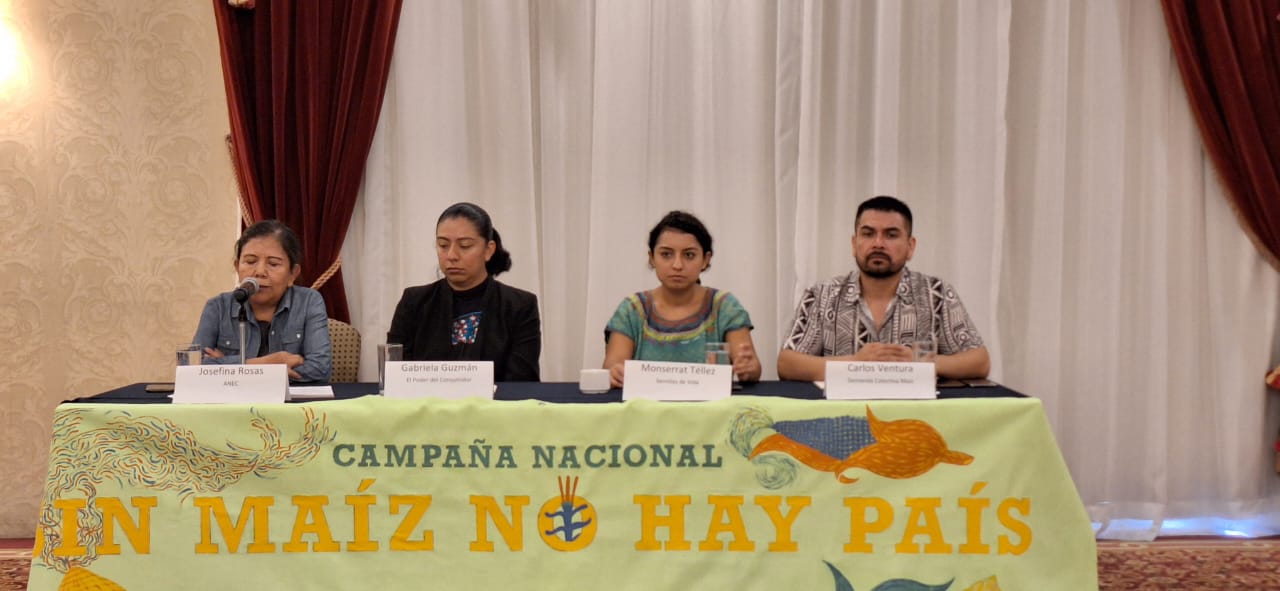
Mexican civil society groups have expressed their opposition to allowing a closed trade panel to decide the fate of their food and environment. For decades, we have organized continuously and creatively in defense of corn from the threat of GMOs. We have worked to expose the nature of the USMCA as an instrument of business interests to override the common interest, and denounce the dispute settlement panel as a mechanism that imposes its own terms and ignores the voices of those who would most suffer its severe consequences.
The only parties allowed to participate outside of governments are formally constituted, non-governmental entities (NGO). Even these may only participate by submitting written opinions with the prior authorization of the panel and the parties.
Five Mexican NGOS managed to submit opinions: the National Association of Marketing Firms for Rural Producers (Asociación Nacional de Empresas Comercializadoras de Productores del Campo-ANEC), the Vicente Guerrero Group of small famers in the state of Tlaxcala, Grupo Vicente Guerrero, the Project on Organization, Development, Education and Research (Proyecto sobre Organización, Desarrollo, Educación e Investigación-PODER), Consumer Power (El Poder del Consumidor) and the Foundation Seeds for Life (Fundación Semillas de Vida A.C.), along with a few U.S. organizations. There are no other mechanisms for participation or listening to society in general.
In addition to the limited space for social participation in the process, no mechanisms have been generated to disseminate the panel’s information in a way that is accessible and understandable to the general population, since the process is only made known through the publication of official documents on a platform that neither the contending parties nor the panel itself disseminate (https://tasefiling.gov/). To fill this gap, the National Campaign “Without Corn There is No Country” initiated the communication campaign #MexicoSantuariodelMaíz (MexicoCornSantuary).
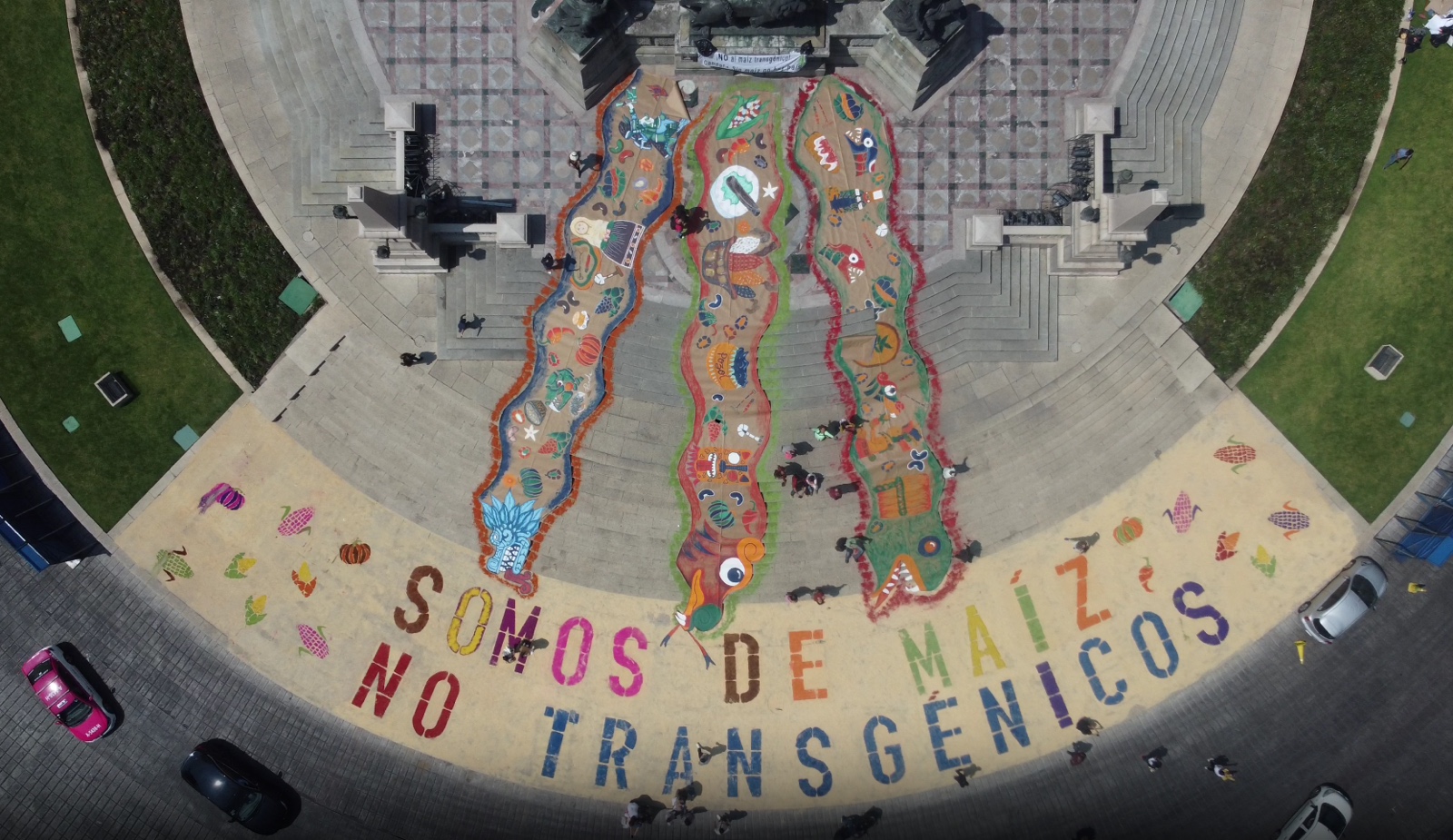
The campaign published official documents and other information necessary to understanding the development of the controversy through the microsite https://maiznativo.org/. As part of this communication campaign, the “Without Corn there is No Country” campaign, the Alliance for Food Health (Alianza por la Salud Alimentaria) and the Collective Demand on Corn (Demanda Colectiva Maíz) called on society to send a letter to the panelists prior to the hearing. We urged the panel to assume its responsibility before the world in the defense of health and the environment in the context of this controversy, and to issue an opinion that opens new horizons in trade relations between the countries, allowing for a transition towards a more sustainable and fairer economic model that protects life.
The response to the call was swift and massive. More than 113,000 people from Mexico and other parts of the world joined in sending the letter. The Mexican organizations presented the results at a press conference on July 25, emphasizing that the response was yet another proof of widespread rejection of the attempts by the U.S. government and biotech agribusiness interests to impose their interests on our country.
More than 113,000 people from Mexico and other parts of the world joined in sending the letter.
A Hearing that Refused to Listen
During the hearing, none of the expressions of society were taken up, neither the written opinions delivered by NGOs, nor the tens of thousands of letters that were sent to the panel. What did happen at the hearing? With the brazenness that has characterized its pro-business stance, the U.S. Trade Representative continued to demand scientific evidence from Mexico on the single point of whether harm of genetically modified corn is substantially different from natural corn, But by law, the party attempting to impose a controversial product or process on another party must be the one to assuming the burden of proof of its harmlessness. The U.S. did not present any experts to present scientific evidence on harmlessness before the panel, nor did it allow testimony from the experts that Mexico called whose reports had already been presented to the panel.
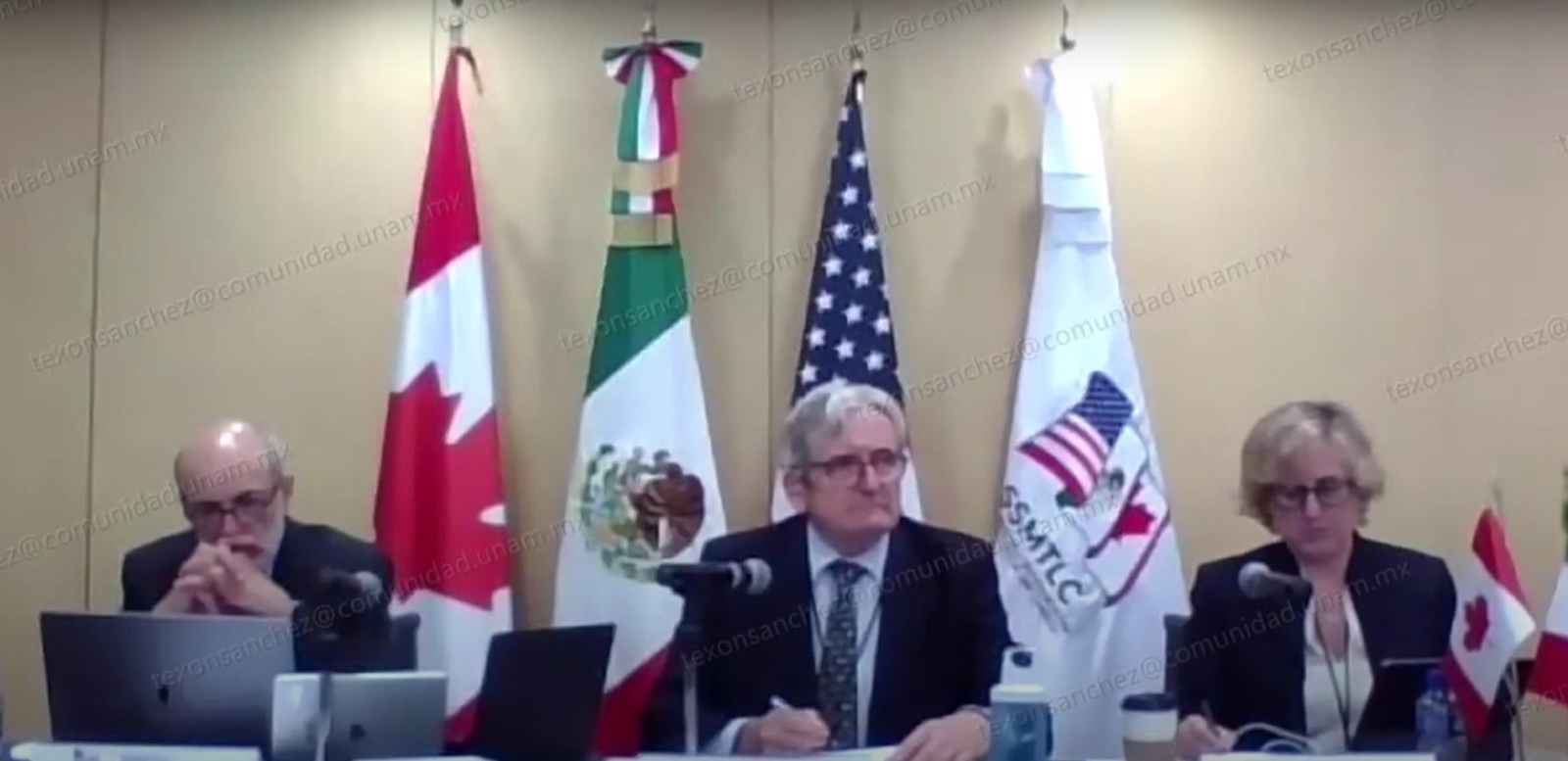
For its part, Mexico divided its participation into four blocks that explained: the factual issues of the dispute and the risks of genetically modified corn and glyphosate to health, biodiversity and native corn varieties; the legal issues that demonstrate the compatibility of the measures taken by the Mexican government with the terms of the USMCA; how these measures are exempted from prosecution by the USMCA and the General Agreement on Tariffs and Trade (GATT); and that there is no valid claim of nullification and impairment established by the United States.
In addition, Mexico explicitly denounced the strategy of the United States government to pressure the panel into issuing a resolution with declaratory effect not only in the Mexico case but so that the U.S. industry can use it as a tool to pressure other jurisdictions with bans or proposed bans on GMO corn and glyphosate, The U.S. government seeks to use this dispute settlement mechanism to defeat regulation on GMO products throughout the world. The Mexican government also noted that the United States seeks to minimize Mexico’s legitimate concerns associated with the use and consumption of genetically modified corn, without meeting a minimum standard of evidence or burden of proof to demonstrate that the measures are inconsistent with the USMCA.
The panel is expected to issue a final report by November 2024. This final part of the process takes place against the backdrop of the change of government in Mexico. It remains to be seen if the new government of Claudia Sheinbaum will energetically pursue the defense of the limitation of imports of corn and glyphosate contemplated in the presidential decree of 2023.
The USMCA is up for review in 2026. Those closely involved expect that the review be merely superficial and will focus on immigration and fentanyl, leaving out the historic demand to remove our basic foodstuffs from the agreement. A free trade agreement cannot be the guiding axis of national public policy decisions that affect entire populations. and much less an agreement with a country that, as demonstrated in the panel proceedings, does not see us as equals.
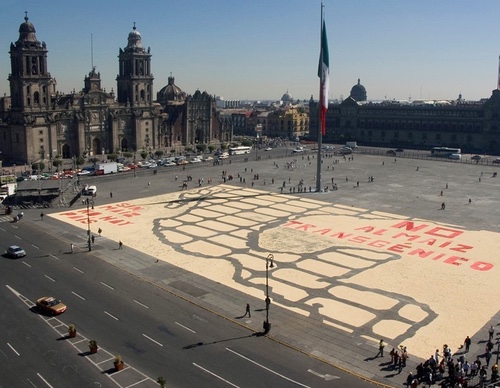
In the face of the constant obstacles presented by free trade agreements, we still have the collective response of the people. Whatever happens with the panel, our native corn will continue to be preserved and planted by Mexican peasant communities and it will be up to civil society to make sure that corn ends up on our tables so that we can continue to enjoy the quality and the enormous biodiversity of maize that we have as a country. Mexican food culture transcends any international agreement (remember in the US it is not even a treaty) regardless of the country with which it has been signed.
José Sampietro is Program Assistent at Mira: Feminisms and Democracies and a member of the “Without Corn there is No Country” campaign in Mexico.
Monserratt Téllez is a member of the “Without Corn there is No Country” campaign in Mexico.



